Words with the root word cap – Words with the root word “cap” captivate us with their diverse meanings and intriguing origins. From headwear to limits, these words have played a pivotal role in shaping our language and culture. Join us on a journey to explore the fascinating world of “cap” and its linguistic adventures.
In this exploration, we will delve into the etymology of “cap,” uncovering its Latin and Greek roots. We will categorize words with this root word based on their semantic fields, creating a tapestry of meanings that range from headwear to containment and limits.
Etymology of Words with the Root Word “Cap”
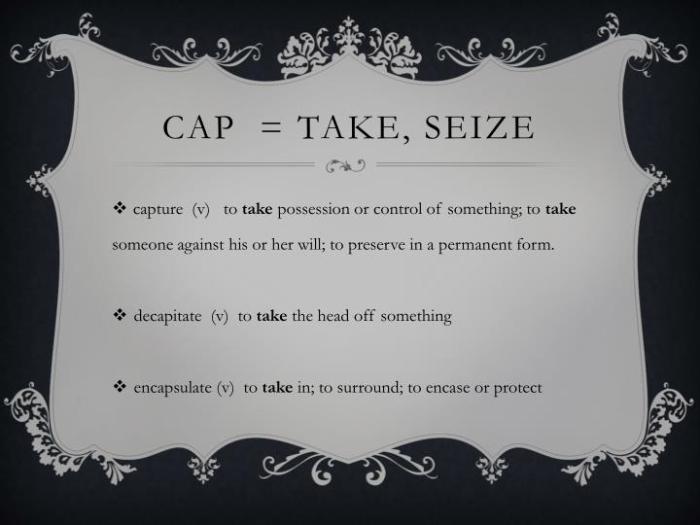
The root word “cap” has a dual origin, deriving from both Latin and Greek languages. In Latin, “capere” signifies “to take” or “to hold,” while in Greek, “kephale” means “head.”
Latin-Derived Words
- Capacity: Ability to contain or hold something
- Capable: Possessing the ability or skill to do something
- Capture: To seize or take hold of something
Greek-Derived Words
- Cephalic: Relating to the head
- Encephalitis: Inflammation of the brain
- Hydrocephalus: Accumulation of fluid in the head
Semantic Field of Words with the Root Word “Cap”

Words with the root word “cap” share a common semantic field related to covering, containment, or limitation. They can be categorized into various subfields based on their specific meanings and usage.
Headwear
- Cap: A type of hat with a visor or brim that covers the head.
- Baseball cap: A type of cap commonly worn in baseball.
- Beanie: A close-fitting cap that covers the head and ears.
Containment
- Bottle cap: A lid that covers the opening of a bottle.
- Pen cap: A cover that protects the tip of a pen.
- Jar cap: A lid that seals a jar.
Limits
- Capacity: The maximum amount that can be contained or accommodated.
- Ceiling: An upper limit or boundary.
- Capstone: The final or crowning element of something.
Figurative and Idiomatic Expressions with “Cap”: Words With The Root Word Cap
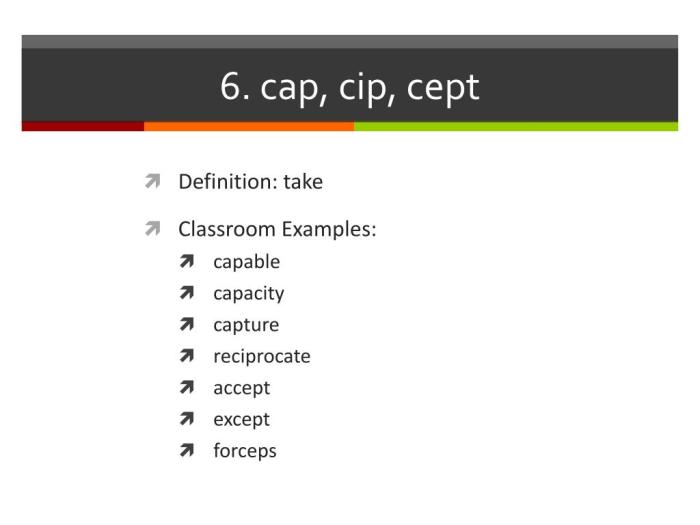
The root word “cap” not only forms literal terms related to head coverings but also extends into figurative and idiomatic expressions. These expressions use “cap” metaphorically to convey various ideas and emotions.
In this section, we will explore common figurative expressions using “cap” and delve into the meanings behind these idioms.
One example of words with the root word cap is capable, meaning having the ability to do something. This root word is also found in the title of the famous mural by Diego Rivera, ” The Uprising “. Rivera’s mural depicts the strength and resilience of the Mexican people, who rose up against oppression.
The root word cap is thus connected to both the ability to do something and the act of standing up for what is right.
Capping Off
The phrase “capping off” is often used to refer to the act of completing or finishing something successfully. It implies adding the final touch or bringing something to a satisfactory conclusion.
- Example:“The presentation capped off a successful conference.”
Putting a Cap On, Words with the root word cap
The expression “putting a cap on” means to limit or restrict something. It suggests setting a boundary or limit, preventing further growth or expansion.
- Example:“The government put a cap on spending to control the budget deficit.”
Tipping One’s Cap
The phrase “tipping one’s cap” is a gesture of respect or acknowledgment. It is often used to show appreciation, gratitude, or admiration.
- Example:“The audience tipped their caps to the performers after the show.”
Captivating
The adjective “captivating” describes something that captures one’s attention and holds it firmly. It implies a strong attraction or fascination.
- Example:“The movie was so captivating that I couldn’t take my eyes off the screen.”
Capping It Off
The phrase “capping it off” is similar to “capping off,” but it often carries a humorous or ironic tone. It is used to describe an unexpected or absurd ending to a situation or event.
- Example:“The party was capped off by a drunken karaoke performance.”
Cultural and Historical Significance of Words with the Root Word “Cap”
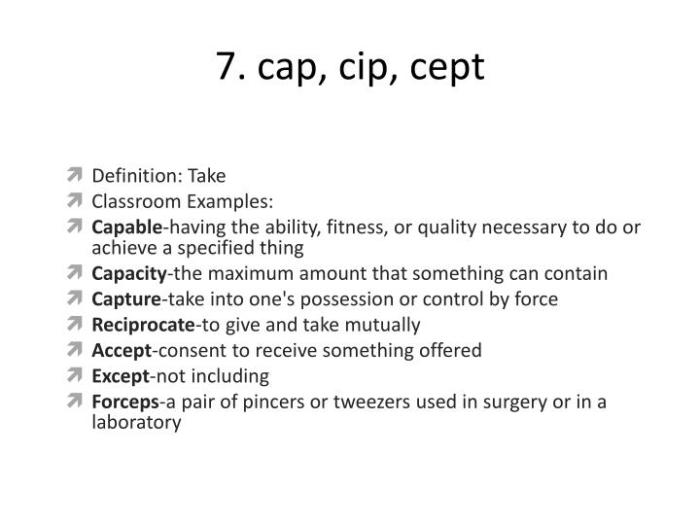
Words with the root word “cap” have a rich cultural and historical significance, spanning various domains such as fashion, politics, and language.
In Fashion
The word “cap” has been used to describe headwear for centuries. In the 16th century, caps were popular among men and women, and were often made of velvet or silk. In the 19th century, caps were worn by both men and women as part of their everyday attire.
Today, caps are still worn as a fashion statement, and come in a variety of styles, from baseball caps to beanies.
In Politics
The word “cap” is also used in politics to refer to a limit or restriction. For example, a “salary cap” is a limit on the amount of money that a team can spend on player salaries. A “spending cap” is a limit on the amount of money that a government can spend.
Caps are often used to control costs or to ensure fairness.
In Language
The word “cap” has also been used in language to refer to a lie or exaggeration. For example, someone who is “capping” is telling a lie. This usage of the word “cap” is thought to have originated in the African-American community in the early 20th century.
Modern Usage and Trends in Words with the Root Word “Cap”
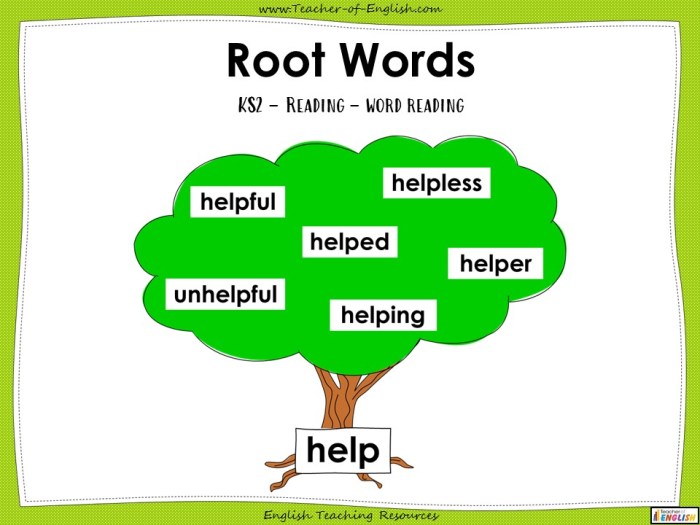
Words with the root word “cap” continue to be prevalent in modern usage, evolving to reflect contemporary trends and cultural shifts.
One notable trend is the increased use of “cap” as a slang term for “lie” or “falsehood.” This usage has become particularly common among younger generations, who often use it to dismiss or discredit information they deem inaccurate or untrustworthy.
Social Media and Slang
The rise of social media has significantly influenced the usage of “cap.” Platforms like Twitter and TikTok have facilitated the rapid spread of slang terms, including “cap,” which has become a widely recognized and frequently used expression.
Additionally, “cap” has taken on a playful and ironic tone in certain contexts. For example, some individuals may use it to jokingly acknowledge a minor exaggeration or embellishment, adding a layer of self-awareness and humor to their communication.
Word Formation and Derivation from the Root Word “Cap”
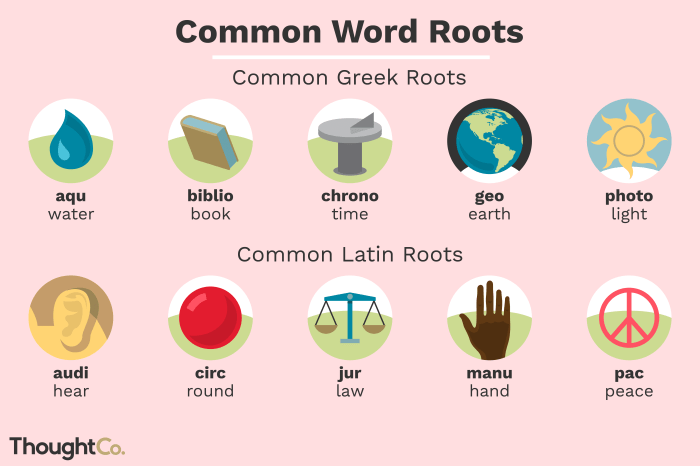
The root word “cap” carries the core meaning of “to cover or put a top on something.” Through various processes of word formation and derivation, this root word gives rise to a range of derivatives with distinct meanings and functions.
Affixation
Affixation involves adding prefixes or suffixes to the root word to modify its meaning. For instance, the prefix “un-” in “uncap” negates the action, indicating the removal of a cap or covering. The suffix “-able” in “capable” transforms the verb into an adjective, describing something that possesses the capacity or ability to perform an action.
Compounding
Compounding combines two or more words to create a new word with a distinct meaning. The word “capstone” is formed by combining “cap” and “stone,” referring to the topmost stone of a structure. “Capsize” is another compound word, combining “cap” and “size,” which means to overturn or turn upside down.
Conversion
Conversion is the process of changing the part of speech of a word without altering its form. For example, the noun “cap” can be converted into a verb, as in “to cap a bottle.” Similarly, the verb “cap” can be converted into a noun, referring to the act of capping something.
Essential Questionnaire
What is the origin of the root word “cap”?
The root word “cap” originates from the Latin word “capere,” meaning “to take” or “to hold,” and the Greek word “kephalē,” meaning “head.”
How many semantic categories can words with the root word “cap” be divided into?
Words with the root word “cap” can be divided into at least three semantic categories: headwear, containment, and limits.
Can you provide an example of a figurative expression using “cap”?
One common figurative expression using “cap” is “to cap it all,” which means “to top it all off” or “to add insult to injury.”